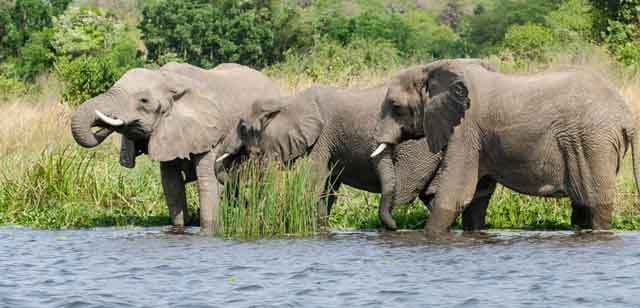ELEPHANTS, PANGOLINS CONTINUE TO SUFFER IN HANDS OF POACHERS DESPITE STRONG LAWS IN PLACE

By www.mknewslink.com
Uganda is greatly endowed with many wildlife species, however, its diversity is hugely threatened by both poaching and wildlife trade.
Key among the most targeted species are the elephants because of their hooves, penises, ivory and tusks, pangolins because of their scales among other species.
In addition to being a source country, Uganda is also a transit node and a regional logistical hub for the trade in illegal wildlife from Central Africa, mostly the DRC’s Garamba National Park.
According to Traffic, a wildlife trade monitoring Non-Governmental Organization (NGO), pangolins have been mostly targeted for poaching and trafficking in Uganda. Uganda is estimated to be losing in excess of Shs.2 trillion annually to Illegal Financial Flows (IFFs) being the fourth-largest illicit activity worldwide, generating $7 – 23bn per year.
With increasing global integration and trade openness, the susceptibility of economies to abuse of trade practices by criminals to move value has increased over time. For instance, in 2021, global trade hit a record high of $28.5 trillion. Such characteristics coupled with inadequate resources and differences in priorities of relevant agencies to facilitate the investigation of illicit trade makes the global financial and trade systems susceptible to Illicit Financial Flows.
IFFs manifest in three broader categories: a). commercial activities like tax evasion, smuggling, abuse of transfer pricing trade mis-invoicing, aggressive tax planning); b). criminal activities like poaching, illegal mineral trade, drug trafficking); and c). corruption.
Vincent Opyene, chief executive of the Natural Resources Conservation Agency, an organization partnering with the Uganda Wildlife Authority to combat wildlife crime, said illegal trade in pangolins is increasing worldwide, including in Uganda.
“The problem of illegal trade in pangolins and pangolin scales is increasing every day and, if not controlled and managed, can easily lead to extinction of the species,” Opyene cautioned.
According to the Oxpeckers Investigative Environmental Journalism, two male adults identified as Bosco Mukasa aged 34 and Simon Kyakwahuwre were arrested in Kibaale western Uganda on 6th July 2020 with one live pangolin after a tipoff from local residents that they deal in pangolins.
The duo was charged with unlawful possession of protected species contrary to Section 36 (1) and 71 (1) (b) of the Uganda Wildlife Act, 2019.
Offenders convicted of crimes related to wildlife species classified as extinct in the wild, or critically endangered, face the highest penalty under Uganda’s Wildlife Act 2019 of a Shs20-billion fine or life imprisonment, or both. However, poaching continues to happen regardless of the strong laws in place.
Bashir Hangi the Communications Manager Uganda Wildlife Authority says there are a number of factors driving the illegal acts in the country. “Some are ranging from cultural, to economic; some people involve in poaching because they want animal parts for rituals, medicine, for use as regalia, others want game meat to supplement their nutritional needs while other poach for the market,” he noted.
Bashir added that the economic motive is behind wildlife trafficking which is considered lucrative, after drugs and human trafficking. For instance, in May 2020 fourteen Chinese nationals were arrested in Uganda in possession of 10 elephant penises worth over US$4.5 million, six tortoises, and half a kilogram of pangolin scales, together worth an estimated US$8 000.
These illegal wildlife products, such as the elephant penises were stockpiled by the poachers and were en route to international destination markets before being seized by the Ugandan authorities.
Opyene also revealed that many poachers continue to be lured in the illegal activity especially poaching pangolins following myths that there is a lot of money to be pocketed. “Every time we arrest poachers who are involved in this they keep telling us it [the scales] will go for about $150 per kilo, and yet I haven’t come across anyone willing to buy pangolin scales at that amount; it is just a myth they keep believing that the market is there,” he noted.
On 20th October, Pascal Achiba was handed a life sentence by the Utilities and Wildlife Court after being convicted for unlawful possession of protected species (with nearly 10 kg of elephant ivory). UWA head Sam Mwandha called the sentence “a landmark achievement in the fight against illegal wildlife trade”.
Achiba who had previously served 18 months in jail for possession of four pieces of ivory was given a life sentence because he was a “habitual offender according to the court’s chief magistrate Gladys Kamasanyu. However, some people had mixed reactions regarding the punishment.
Kevin Karugaba a peasant famer in Matanda in Kanungu district says this was too harsh arguing that at least the court would have given Achiba a lenient punishment since the authorities continue to fastrack the wildlife protection. “Many government officials and civil servants are corrupt, others steal drugs from hospitals putting many lives at risk but none of them has ever been sentenced to life imprisonment,” Karugaba said.
He added “it’s not okay killing the elephants since they are sources of revenue for the country but I think Achiba also has a family looking up to him and now they are left to suffer that’s why I think the court would have been a bit lenient.”
Sabiiti Nicholas a hotelier and tourism enthusiast noted that the court made the right decision if Achiba was not a firs time offender.
“The country loses a lot of revenue every time such species are killed but many people just focus on individual gain which doesn’t make sense to me,” Sabiiti said.
Harmony Kobusingye a social worker also noted that the court’s decision was a good lesson to other offenders. “I think this serves as a key lesson to all those who still involve in the vice and maybe our wildlife can also have justice,” she noted.
The Uganda government has instituted various mechanisms to counter IFFs through the creation of institutions such as the Financial Intelligence Authority (FIA), Criminal Investigations Department (CID), URA Customs, and the Inspectorate of Government among others. Despite these efforts, commitment and collaboration among these institutions remains low.
Bashir says poaching still happens although at minimal levels following UWA’s vigilance in apprehending wildlife offenders which threatens poachers. “We are engaging in public sensitization which has made people realize that poaching steals from us and as such a number have quit the vice,” Bashir added.
UWA executive director Sam Mwandha is optimistic that in years to come, the organization will have the best workforce in wildlife protection in the region.
“This process will result in us having a highly skilled workforce in the East African region, which will help the country fight wildlife crime. Once we have a highly skilled force, criminals will hate their trade and wildlife numbers will increase,” said Mwandha































 Views Today : 86
Views Today : 86 Views Yesterday : 411
Views Yesterday : 411 Views Last 7 days : 3280
Views Last 7 days : 3280 Views This Month : 10335
Views This Month : 10335 Total views : 1447939
Total views : 1447939 Who's Online : 0
Who's Online : 0 Your IP Address : 18.188.211.58
Your IP Address : 18.188.211.58